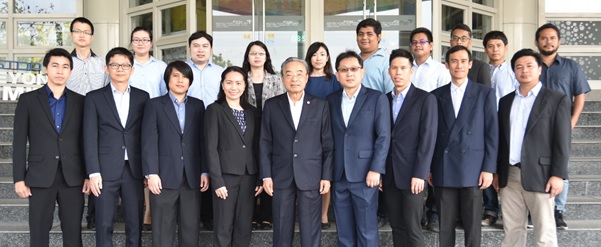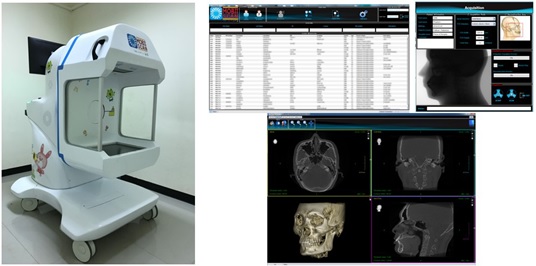NSTDA research team responsible for developing DentiiScan 2.0, the first Thai-made cone-beam computed tomography (CBCT) dental scanner, was presented with Outstanding Technologist Award 2019 by the Foundation for the Promotion of Science and Technology under the Patronage of His Majesty the King. The team of nineteen researchers was spearheaded by Prof. Pairash Thajchayapong, former NSTDA President and currently serving as Senior Advisor to NSTDA President, with two key team leaders – Dr. Saowapak Thongvigitmanee leading software development and Dr. Kritkrai Sitthisereepratheep in charge of hardware development.

The project to develop a CBCT scanner for providing 3D internal anatomy images was initiated in 2007. The platform now has three applications:
• DentiiScan for dental and maxillofacial structures;

• MobiiScan: a mobile scanner for skull structure; and

• MiniiScan for intraoperatively determining adequate margin in abnormal microcalcification of breast specimen.

Scanning performance of these CBCT machines have been evaluated with a phantom, a specially designed object used for evaluating, analyzing, and tuning the performance of medical imaging devices. They have also been tested for the radiation safety and the electrical and electronic product safety according to international standards. Prototypes of these CBCT scanners were manufactured in an ISO 13485-certified facility at NSTDA and underwent extensive clinical studies.
This technology has now been licensed to a company. To date, 60 DentiiScan machines have been installed in hospitals throughout Thailand and have performed over 7,000 scans. MobiiScan machines have performed over 1,000 scans at the Faculty of Medicine of Prince of Songkla University, the Medicine and Dentistry Faculties of Chiang Mai University, King Chulalongkorn Memorial Hospital; whereas MiniiScan has been used over 100 scans at the Faculty of Medicine of Prince of Songkla University.
The development of CBCT scanner demonstrates the success of local R&D that makes a significant impact as the it enables the local manufacturing of these machines, thus strengthening Thailand’s medical device industry. As the machine’s price is brought down considerably, more hospitals can afford to provide their patients with this advanced diagnosis and treatment accordingly.
